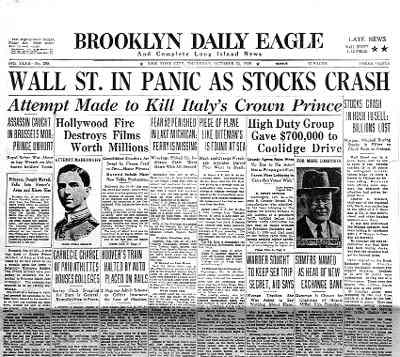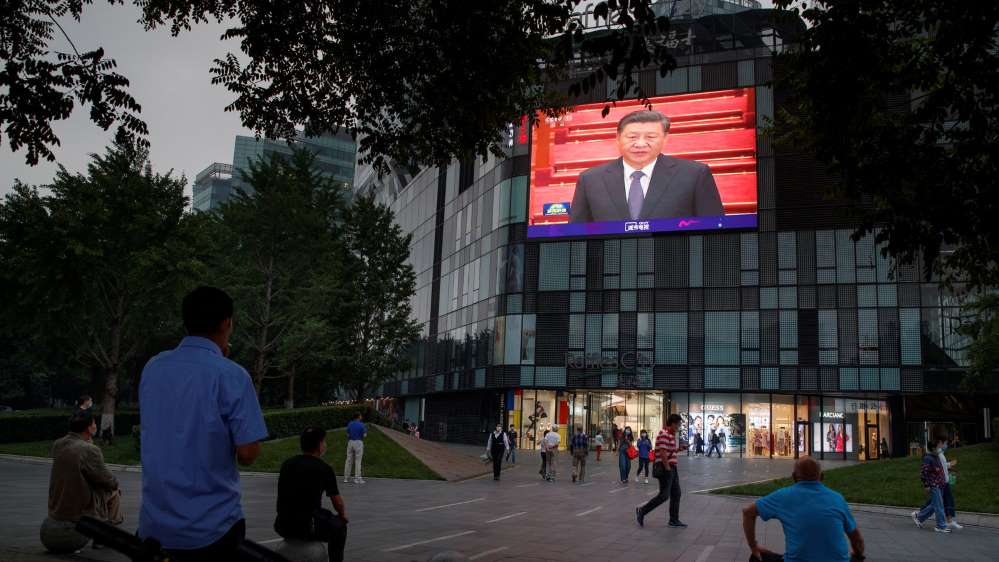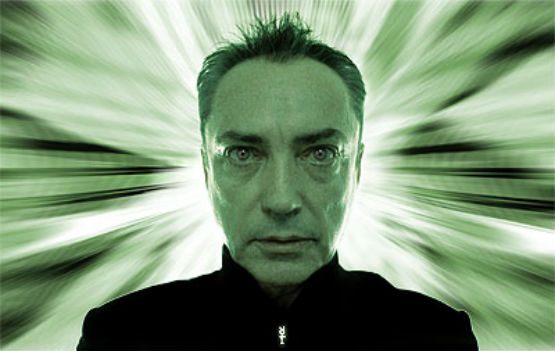The New World Order
One Possibility!
In regards to the current economic situation, because of last year's global recession and also the recent economic slowdown a catastrophic global economic crisis has occurred.
After the stock market crashed, all of the financial markets were closed for two weeks. Many were in a state of shock!
Hyperinflation, already a concern in Latin America had begun to affect other economies as well. Because of these concerns regarding hyperinflation and the stock market crash there was total chaos, globally! Everyone panicked so much that there was a run on the banks so all of the banks were forced to close. Some have since reopened. The media and the press had 24/7 coverage of all of this on every tv channel.
Some businesses were forced by the government to temporarily close their doors during which time government employees examined business records to any companies/corporations they wanted. Also, the internet and all social media sites were shut down so they could start a new internet service with only government sanctioned streaming news programs. The reason they said was that it was a necessary evil and we had to accept it.
Now they're telling us on the daily news reports that some sort of global restructuring is going on behind the scenes involving all of the world's financial markets, economic blocks, and that everything will be okay. The other day we heard they would be implementing a new global cashless system any day now and when this happens we will no longer be able to use cash. Biometric and rfid systems/alternatives are being installed everywhere. Our hands, fingers and retinas were scanned and recorded for this new biometric system.
Our newly appointed global leader made his first appearance and he somewhat explained our economic situation. Everyone's shocked that all of this has so suddenly come to pass after the recent stock market collapse. It's difficult to believe this is really happening. It's crazy. Everything that the global president says now becomes the law. NWO banners and slogans are showing up everywhere, throughout every neighborhood, street, and city. Massive tv displays are being installed throughout every region and major city. These are easily visible and are currently displaying the daily news reports.
We all agree martial law has become a reality. U.N. troops, the military police, and the local police have been stationed throughout every city. I never imagined anything like this could happen! Biometric and rfid identification systems are an everyday part of life. Everything's gone digital overnight. Those who have resisted this new system and are trying to live off the grid are already facing serious problems going about their daily lives.
Just recently there were new policies established for the masses regarding those who haven't gone in and received their biometric identification stating that it's now considered mandatory!
A friend of mine and his family had decided not to be included in the biometric program were on their way to live underground at one of their relatives properties. They were then stopped at one of the many local law enforcement checkpoints. Afterward he and his wife and kids have turned up missing and they haven't been seen or heard from since.
I really hope they haven't been sent to an internment camp!
Living in a global fascist state!
Read more »
IMF speech made on February 9, 2022
Let me start by thanking the Atlantic Council for providing a fitting venue to discuss central banks’ forays into Digital Currencies.
Since its founding in 1961, the Council has made important contributions to strategic, political, and economic policy debates. Those debates have served us well, helping us to test the boundaries of our thinking and be better prepared for what lies ahead.
So, today, we aim to test our thinking again. We have moved beyond conceptual discussions of CBDCs and we are now in the phase of experimentation. Central banks are rolling up their sleeves and familiarizing themselves with the bits and bytes of digital money.
These are still early days for CBDCs and we don’t quite know how far and how fast they will go. What we know is that central banks are building capacity to harness new technologies—to be ready for what may lie ahead.
Read more »
The perception is that our day-in day-out world is real.
The truth is that this world is a hoax, an elaborate deception spun by an all-powerful Illuminati controlled secret society presided over by the global elite.
The Illuminati call the shots in every major upheaval that they cause.
Their sphere of activity extends over the entire globe.
Their ambition and greed for wealth and power knows no bounds.
It is also their target to depopulate the globe and maintain a much lower population compared to what we have now.
There are certain methods of subjugation and control which are indispensable to the Illuminati.
One is, of course, complete authority over all financial systems, especially borrowing and lending.
With all banks under their direct supervision.
At the highest level the World Bank decides the fate of countries.
And it is an interesting and amazing fact that both the Federal Reserve Bank and the Bank of England are controlled by these Illuminati dynasties, in spite of the names of these banks.
It has been said that both Abraham Lincoln and John F. Kennedy wanted to change this system.
When A Real Power Move Is To Be Made It Will Be Done Suddenly!
If you want to bring about a "New World Order", you must first crash the current system.
The Illuminati will never allow their global hegemony to be destroyed.
The expression of this global control has been the US dollar.
They will trigger a global fiat currency meltdown.
All fiat currencies will be attacked and will collapse.
The last currency to collapse will be the US dollar.
They will then bring in a One World Digital Currency under the purview of a World Government.
There's going to be a somewhat prepared response for any controlled opposition, but the need for this is going to be relatively limited since there's not going to be a realistic threat to these Illuminati and their plans.
'They Live' is a 1988 American science fiction horror film written and directed by John Carpenter. The film stars Roddy Piper, Keith David and Meg Foster. It follows a nameless drifter (called "John Nada" in the credits), who discovers the ruling class are in fact concealing their appearance and manipulating people to spend money, breed, and accept the status quo with subliminal messages in mass media. Based on Ray Nelson’s short story Eight O’Clock in the Morning, the movie is one of those rare subversive stories that forces viewers to question their world and their surroundings.
Right from the beginning, as we see Nada walking around Los Angeles with his backpack, the movie sets a particular mood: Something is not quite right. While Nada appears to be a happy-go-lucky kind of guy, the city is not happy and it is not too kind to happy-go-lucky kind of guys. Quite the contrary, there is a sense of impending doom in the air: Poverty is rampant, helicopters fly around the city and street preachers speak of soulless beings ruling the world.
A preacher’s description of the "masters" is applicable to the Illuminati.
Seeking shelter Nada enters an empty church and discovers a hidden box. In an alley, he opens the box and finds dozens of sunglasses. Taking one, he hides the box of remaining sunglasses in a garbage can.
Nada discovers the sunglasses have unique properties. After putting on a pair, he sees the world in black and white and discovers it is not what it seems. Media and advertising hide constant subliminal totalitarian commands to obey and conform. When viewing those of wealth and authority Nada discovers they're not human.
When he has his sunglasses on, Nada sees through the smoke and mirrors projected by advertisement and mass media. He only sees the core of their message and the only reason why they exist. No matter which magazine Nada flips open, he sees the same subliminal messages, which tells a lot about the true function of "celebrity" and "fashion" magazines. Despite the fact that they are all different, they all ultimately serve the same purpose: To reinforce messages from the elite to the masses.
We’re living in two worlds, you and I.
There’s the world we see (or are made to see) and then there’s the one we sense (and occasionally catch a glimpse of), the latter of which is a far cry from the propaganda-driven reality manufactured by the government and its corporate sponsors, including the media. Indeed, what most people perceive as life in a privileged, progressive and free society — is a far cry from reality, where economic inequality is growing, real agendas and real power are buried beneath layers of Orwellian doublespeak and corporate obfuscation, and "freedom," such that it is, is meted out in small, legalistic doses by militarized police armed to the teeth.
All is not as it seems.
It is a fact that advocates of the New World Order will attempt to fulfill the world’s messianic expectations with an antichrist. 2nd Thessalonians 2:3-4 tells us that the last days will not come until “the man of sin is revealed, the son of perdition,” commonly called the Antichrist.
He will sit in the Temple in Jerusalem and demand to be worshipped as God. 2nd Thessalonians 2:8 He is also called “the beast,” in the Book of Revelation. This tyrannical world dictator will be empowered by Satan and be the embodiment of all that is opposed to God.
Like Hitler the antichrist will "have a mouth that will speak very great things, and his look will be more imposing than his fellows." He will think to change times and laws and is referred to as "The King of fierce countenance" who shall "have an understanding of dark sentences." Daniel 7:20, 25; 8:23 Because of this man all, both small and great, rich and poor, free and slave, will be forced to receive a mark on their right hand or on their foreheads, so that no one may buy or sell except one who has the mark, or the name of the beast, or the number of his name. Rev 13:16-17
This man will come on the scene and will offer to lead the world into total peace. He will be recognized throughout the world as a man of peace. He will promise to solve the Middle East conflict. He will bring harmony in the ecumenical-ecclesiastical church. He will offer economic solutions to the world's problems. He will arise as a world leader of peace and prosperity and reign exactly three and a half years as the world's greatest dictator.
Beware of when this man appears on the world scene. His leadership will take the world into a Great Tribulation of terror, wars, suffering and death.
Woe to the idol shepherd that leaveth the flock! The sword shall be upon his arm, and upon his right eye: his arm shall be clean dried up, and his right eye shall be utterly darkened. Zechariah 11:17
Read more »
(A NWO World Wide Government Accompanied By A Solitary World Bank And A Single World Religion.) (The NWO Will Have A Mapped Out Strategy And A Strategic Plan To Implement The Use Of RFID Microchips, Biometric Access Systems, Biometric Collection Devices - Handheld Scanners And Cameras, Biometric Databases, Unlimited Government Access To Data, Data Mining, Unmanned Drones, Travel Restrictions, Surveillance Cameras, Pre-Crime Surveillance, And Militarized Police.)

| On October 29, 1929, The Stock Market Crashed. Will it happen again? Will the world this time be rescued by and come under the control of a madman? |

| The NYSE. The world's largest stock exchange market. US stocks plunge amid Wall Street crisis - 29 Sept 08. |

The rise of the one-world government is beginning to take its shape as early as now.
Its form is hidden in the emerging New World Order.
The New World Order is being established by the Elite of the Elites and consists of the Fourth Reich of the SuperRich/the Lords of Money/the International Bank Cartels/the Secret Societies/the Brotherhood and the Order/the Committee of the 300 Billionaires of the World including the Power Elite of 13 Old Line Families through the years.
This group envisions a one world banking system and currency that will give in to a cashless computer financial system, one world centralized control of global population, global control of the world’s environment, economy, trade and army.
They have already made a giant step. The year was 1945, when they drafted and created the United Nations.
These men have unbelievable power and they have spelled out their agenda in advance.
That global agenda is constructed around six goals.
The method by which these are going to be brought about will most likely be either a GLOBAL DEPRESSION, THIRD WORLD WAR, or MAYBE BOTH.
Goal #1 : The establishment of international economic order (cashless society)
Goal #2: The establishment of a one-world government
Goal #3 : The conquest and subjugation of two super powers (USA and USSR)
Goal #4: The ascension of the United States of Europe as the dominant nation in a Confederated one-world government
Goal #5: The ushering in of a supreme world leader to preside over the new unified one-world government
Goal #6 : The establishment of a one-world religion which will coordinate all the world’s religions, cults, faith groups and spiritual beliefs under the guidance of Supreme Pontiff
Read more »
When the Chula Vista police receive a 911 call, they can dispatch a flying drone with the press of a button.
On a recent afternoon, from a launchpad on the roof of the Chula Vista Police Department, they sent a drone across the city to a crowded parking lot where a young man was asleep in the front seat of a stolen car with drug paraphernalia on his lap.
When the man left the car, carrying a gun and a bag of heroin, a nearby police car had trouble following as he sprinted across the street and ducked behind a wall. But as he threw the gun into a dumpster and hid the bag of heroin, the drone, hovering above him, caught everything on camera. When he slipped through the back door of a strip mall, exited through the front door and ran down the sidewalk, it caught that, too.
Watching the live video feed, an officer back at headquarters relayed the details to the police on the scene, who soon caught the man and took him into custody. Later, they retrieved the gun and the heroin. And after another press of the button, the drone returned, on its own, to the roof.
Each day, the Chula Vista police respond to as many as 15 emergency calls with a drone, launching more than 4,100 flights since the program began two years ago. Chula Vista, a Southern California city with a population of 270,000, is the first in the country to adopt such a program, called Drone as First Responder.
Read more »
(George Washington (1732-1799) Founding Father, 1st US President, 'Father of the Country'. He spoke of the Illuminati in a letter written to the Reverend G. W. Snyder (24 October 1798). He said: "It is not my intention to doubt that the doctrines of the Illuminati and the principles of Jacobinism had not spread to the United States. On the contrary, no one is more fully satisfied of this fact than I am".)
Washington issued several warnings shortly before his death, about the Illuminati. Washington knew that the Illuminati, based in Europe, had arrived on American shores. In 1789; John Robison, a Scottish scientist warned all Masonic leaders in America that the Illuminati had infiltrated into their lodges and on July 19, 1789; David Papen, President of Harvard University, issued the same warning to the graduating-class and lectured them on how Illuminism was having an influence on American politics and religion, and to top it off; John Quincy Adams, who had organized the New England Masonic Lodges, issued his warnings.
In 1785, the Columbia Lodge of the Illuminati was established in New York City. Among its members were Governor DeWitt Clinton, Horace Greeley (politician and editor of the New York Daily Tribune), Charles Dana, and Clinton Roosevelt (the ancestor of Franklin D. Roosevelt). Roosevelt wrote a book called Science of Government Founded on Natural Law, in which he wrote: "There is no God of justice to order things aright on earth, if there be a God, he is a malicious and revengeful being, who created us for misery." He referred to himself and other members as the "enlightened ones," and said that the U.S. Constitution was a "leaky vessel" which was "hastily put together when we left the British flag," and therefore needed revision.
In 1786, a lodge was started in Portsmouth, Virginia, where allegedly, Thomas Jefferson was a member; followed by fourteen others in different cities of the thirteen colonies.
In April 1793 France sent new ambassador Edmond Genet to America so he could collect payment for the American debt incurred during the American Revolution. The money was to be used to finance France's war with England. However, his real reason for being here was to gain political favor for France and spread Illuminism, which he did through the establishment of 'Democratic Clubs.'
Washington said of "the clubs" that they "...would shake the government to its foundations."
Read more »
Cost subsidized by charitable donations and grants, bring the unprecedented success of America's most successful, time-proven and cost efficient Crime Camera program to your community for as little as $300/yr per Crime Camera or $1100/yr per License Plate Recognition (LPR) Camera!
A true Community-Based Crime Camera program, cameras may be installed on homes, businesses, churches, and schools as well as utility poles and public buildings then stream directly to your local authorities and the Project NOLA National RTCC at the University of New Orleans. Available Nationwide, Project NOLA will make your community a safer place to live, work and visit!
Don't worry about purchasing, renting or leasing expensive cameras as Project NOLA uses its own funds to purchase extremely high-end crime cameras for your community. Most all camera models provided by Project NOLA feature Sony STARVIS NightVision to see Color at Night, Advanced Artificial Intelligence to accurately and automatically detect and alert upon suspicious activity, redundant recording to prevent data lose, generously long 5 year warranties, and more!
Read more »
A Panoptic Video Surveillance See-Thru 3D System could be loosely described as a formalised, scalable implementation of X-ray vision. The system enables one or more surveillance agents, using a single high resolution, auto-stereoscopic display, to remotely monitor the security situation of an arbitrarily large number of locations at-a-glance.
The system would allow a single agent to monitor thousands of places at the same time without overwhelming them with the massive amount of information being processed and displayed. It enables this by using artificial intelligence to determine what’s important to look at.
The surveillance agent's mental load is radically optimized towards monitoring only what is most critical to security: presence and movement of (groups of) people and vehicles inside a campus/site and its buildings as well as any security-sensitive events (such as fires, smoke, badge access, assemblies, gun-shots, people running etc).
Agents can see, hear and transport their focused viewpoint through walls, floors and ceilings, zooming into a specific location to monitor it at a level so acute that it seems beyond the levels of even science fiction.
Designed to enable both wholistic site-wide and granular-level security, the system is ideal for monitoring airports, shipping ports, transit sites and other ports-of-entry, hotels, casinos, shopping malls, campuses, military bases, large buildings and building complexes, offering total situational awareness at a glance.
Read more »

















